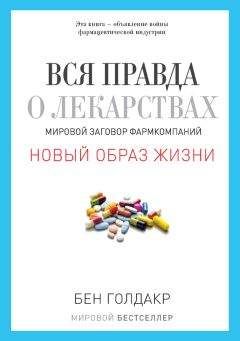Если вы чувствуете, что оклеветали вас или вашу компанию или что здесь что-то попросту не соответствует действительности, я прошу вас написать мне, чтобы мы могли взглянуть на ваши тревоги и изменить или прояснит написанное, если это нужно. Я предлагаю это добровольно, без чувства страха или угрозы: я просто думаю над тем, как всё должно работать. Как я часто повторял в этой книге, описанные в ней проблемы являются систематическими и распространенными. Специфические истории, включенные в нее, даны для иллюстрации точек методологии, и эти точки будут иметь смысл только в том случае, если их приложить к реальным исследованиям. Я надеюсь, вы рассмотрите все истории, имеющие отношение к вам, в том духе, в каком это ожидалось, и сможете распознать истинную тревогу и интересы народа в поднятых вопросах.
Глава 1. Пропавшие данные1. Bourgeois FT, Murthy S, Mandl KD. Outcome Reporting Among Drug Trials Registered in ClinicalTrials.gov. Annals of Internal Medicine. 2010;153(3):158-66.
2. Bero L, Oostvogel F, Bacchetti P, Lee K. Factors Associated with Findings of Published Trials of Drug-Drug Comparisons: Why Some Statins Appear More Efficacious than Others. PLoS Med. 2007 Jun 5;4(6):e184.
3. Kelly RE Jr, Cohen LJ, Semple RJ, Bialer P, Lau A, Bodenheimer A, et al. Relationship between drug company funding and outcomes of clinical psychiatric research. Psychol Med. 2006 Nov;36(11):1647-56.
4. Bekelman JE, Li Y, Gross CP. Scope and impact of financial conflicts of interest in biomedical research: a systematic review. JAMA 2003;289:454-65. Lexchin J, Bero LA, Djulbegovic B, Clark O. Pharmaceutical industry sponsorship and research outcome and quality: systematic review. BMJ 2003;326:1167-70.
5. Sismondo S. Pharmaceutical company funding and its consequences: A qualitative systematic review. Contemporary Clinical Trials. 2008 Mar;29(2):109-13.
6. Eyding D, Lelgemann M, Grouven U, Harter M, Kromp M, Kaiser T, et al. Reboxetine for acute treatment of major depression: systematic review and meta-analysis of published and unpublished placebo and selective serotonin reuptake inhibitor controlled trials. BMJ. 2010 Oct 12;341:c4737-c4737.
7. Suntharalingam G, Perry MR, Ward S, Brett SJ, Castello-Cortes A, Brunner MD, et al. Cytokine storm in a phase 1 trial of the anti-CD28 monoclonal antibody TGN1412. N. Engl. J. Med. 2006 Sep 7;355(10):1018-28.
8. Expert Group on Phase One Clinical Trials: Final report [Internet]. 2006 [cited 2012 Apr 5]. Available from: http://www.dh. gov.uk/en/Publicationsandstatistics/Publications /PublicationsPolicyAndGuidance/DH_063117
9. Decullier E, Chan A-W, Chapuis F. Inadequate Dissemination of Phase I Trials: A Retrospective Cohort Study. PLoS Med. 2009 Feb 17;6(2):e1000034.
10. Cowley AJ, Skene A, Stainer K, Hampton JR. The effect of lorcainide on arrhythmias and survival in patients with acute myocardial infarction: an example of publication bias. International journal of cardiology. 1993;40(2):161-6. Iain Chalmers was the first to raise TGN1412 and anti-arrhythmics as examples of the harm done when individual early trials are left unpublished. They are the best illustrations of this problem, but you should not imagine that they are unusual: the quantitative data shows that they are just two among many, many similar cases.
11. Antman EM, Lau J, Kupelnick B, Mosteller F, Chalmers TC. A comparison of results of meta-analyses of randomized control trials and recommendations of clinical experts. Treatments for myocardial infarction. JAMA. 1992 Jul 8;268(2):240-8.
12. Turner EH, Matthews AM, Linardatos E, Tell RA, Rosenthal R. Selective Publication of Antidepressant Trials and its Influence on Apparent Efficacy. N Engl J Med. 2008 Jan 17;358(3):252-60.
13. Here is the classic early paper arguing this point: Chalmers Iain. Underreporting Research Is Scientific Misconduct. JAMA. 1990 Mar 9;263(10):1405–1408.
14. Sterling T. Publication decisions and their possible effects on inferences drawn from tests of significance or vice versa. Am Stat Assoc J 1959;54:30-4.
15. Sterling TD, Rosenbaum WL, Weinkam JJ. Publication decisions revisited the effect of the outcome of statistical tests on the decision to publish and vice-versa. Am Stat 1995;49: 108-12.
16. Bacon F (1645). Franc Baconis de Verulamio/Summi Angliae Cancellarii/Novum organum scientiarum. [Francis Bacon of St. Albans Lord Chancellor of England. A ‘New Instrument’ for the sciences] Lugd. Bat: apud Adrianum Wiingaerde, et Franciscum Moiardum. Aphorism XLVI (p.45–46).
17. Fowler T (1786). Medical reports of the effects of arsenic in the cure of agues, remitting feveres and periodic headachs. London: J Johnson, pp 105–107.
18. Hemminki E. Study of information submitted by drug companies to licensing authorities. Br Med J. 1980 Mar 22;280(6217): 833-6.
19. Lee K, Bacchetti P, Sim I. Publication of clinical trials supporting successful new drug applications: a literature analysis. PLoS Med 2008;5(9):e191.
20. Melander H, Ahlqvist-Rastad J, Meijer G, Beermann B. Evidence b(i)ased medicine selective reporting from studies sponsored by pharmaceutical industry: review of studies in new drug applications. BMJ 2003;326:1171-3.
21. Rising K, Bacchetti P, Bero L. Reporting Bias in Drug Trials Submitted to the Food and Drug Administration: Review of Publication and Presentation. PLoS Med. 2008 Nov 25;5(11):e217.
22. Scherer RW, Langenberg P, von Elm E. Full publication of results initially presented in abstracts. Cochrane Database Syst Rev 2007; 2: MR000005.
23. Song F, Parekh S, Hooper L, Loke YK, Ryder J, Sutton AJ, et al. Dissemination and publication of research findings: an updated review of related biases. Health Technol Assess. 2010 Feb;14(8):iii, ix-xi, 1-193.
24. Dickersin K. How important is publication bias? A synthesis of available data. Aids Educ Prev 1997;9(1 SA):15–21.
25. Ioannidis J. Effect of the statistical significance of results on the time to completion and publication of randomized efficacy trials. JAMA 1998;279:281-6.
26. Bardy AH. Bias in reporting clinical trials. Brit J Clin Pharmaco 1998;46:147-50.
27. Dwan K, Altman DG, Arnaiz JA, Bloom J, Chan AW, Cronin E, et al. Systematic review of the empirical evidence of study publication bias and outcome reporting bias. PLoS ONE 2008;3(8):e3081.
28. Decullier E, Lheritier V, Chapuis F. Fate of biomedical research protocols and publication bias in France: retrospective cohort study. BMJ 2005;331:19. Decullier E, Chapuis F. Impact of funding on biomedical research: a retrospective cohort study. BMC Public Health 2006;6:165.
29. Cronin E, Sheldon T. Factors influencing the publication of health research. Int J Technol Assess 2004;20:351-5.
30. Song F, Parekh S, Hooper L, Loke YK, Ryder J, Sutton AJ, et al. Dissemination and publication of research findings: an updated review of related biases. Health Technol Assess. 2010 Feb;14(8):iii, ix-xi, 1-193.
31. This was first pointed out to me by Jamie Heywood from PatientsLikeMe, who spent huge resources trying and failing to replicate research findings in another area of medicine. The last time I saw him we talked about writing up his idea that the likelihood of a claim being true is proportional to the cost of making it, and inversely proportional to the cost of refuting it. We’ve not done so, and until then, a description of our conversation is the only reference for this neat idea.
32. Begley CG, Ellis LM. Drug development: Raise standards for preclinical cancer research. Nature. 2012 Mar 28;483(7391): 531-3.
33. Harrabin R et al (2003). Health In The News, The King’s Fund, London, UK.
34. Forsyth, Alasdair J. M. 2001. Distorted? a quantitative exploration of drug fatality reports in the popular press. International Journal of Drug Policy 12, no. 5–6 (November 1): 435–453.
35. Dickersin K, Min YI, Meinert CL: Factors influencing publication of research results: follow-up of applications submitted to two institutional review boards. JAMA 1992, 267:374–378.
36. Olson CM, Rennie D, Cook D, Dickersin K, Flanagin A, Hogan JW, Zhu Q, Reiling J, Pace B: Publication bias in editorial decision making. JAMA 2002, 287:2825–2828.
37. Lee KP, Boyd EA, Holroyd-Leduc JM, Bacchetti P, Bero LA. Predictors of publication: characteristics of submitted manuscripts associated with acceptance at major biomedical journals. Med J Aust 2006;184:621-6. Lynch JR, Cunningham MRA, Warme WJ, Schaad DC, Wolf FM, Leopold SS. Commercially funded and United States-based research is more likely to be published; good-quality studies with negative outcomes are not. J Bone Joint Surg Am 2007;89:1010-8. Okike K, Kocher MS, Mehlman CT, Heckman JD, Bhandari M. Publication bias in orthopaedic research: an analysis of scientific factors associated with publication in the Journal of Bone and Joint Surgery. J Bone Joint Surg Am 2008;90:595–601.
38. Epstein WM. Confirmation response bias among social work journals. Sci Techol Hum Values 1990;15:9-38.
39. Mahoney MJ. Publication prejudices: an experimental study of confirmatory bias in the peer review system. Cognitive Ther Res 1977;1:161-75.
40. Ernst E, Resch KL. Reviewer bias a blinded experimental study. J Lab Clin Med 1994;124:178-82.
41. Abbot NE, Ernst E. Publication bias: direction of outcome less important than scientific quality. Perfusion 1998;11:182-4.
42. Emerson GB, Warme WJ, Wolf FM, Heckman JD, Brand RA, Leopold SS. Testing for the Presence of Positive-Outcome Bias in Peer Review: A Randomized Controlled Trial. Arch Intern Med. 2010 Nov 22;170(21):1934-9.
43. Smith R. The Trouble With Medical Journals. RSM Books, UK; 2006.
44. Weber EJ, Callaham ML, Wears RL, Barton C, Young G. Unpublished research from a medical specialty meeting: why investigators fail to publish. JAMA 1998;280:257-9.
45. Kupfersmid J, Fiala M. A survey of attitudes and behaviors of authors who publish in psychology and education journals. Am Psychol 1991;46:249-50.
46. Song F, Parekh S, Hooper L, Loke YK, Ryder J, Sutton AJ, et al. Dissemination and publication of research findings: an updated review of related biases. Health Technol Assess. 2010 Feb;14(8):iii, ix-xi, 1-193.
47. Gotzsche PC, Hrobjartsson a, Johansen HK, Haahr MT, Altmar DG, Chan A-W: Constraints on publication rights in industryinitiated clinical trials. JAMA 2006, 295:1645–1646.
48. Gornall, J. ‘Industry attack on academics.’ BMJ 338, no. mar09 1 (March 9, 2009): b736-b736.
49. Ibid.
50. Steinbrook R. Gag clauses in clinical-trial agreements. N. Engl. IJ. Med. 2005 May 26;352(21):2160-2.
51. Mello MM, Clarridge BR, Studdert DM. Academic medical centers’ standards for clinical-trial agreements with industry. N. Engl. J. Med. 2005;352(21):2202.
52. This is one of many stories for which I recommend delving into the horrible details, if you’re interested. A good place to start here is Prof David Colquhoun’s blog on the topic, with many links http://www.dcscience.net/?p=193 and this BMJ piece written by a lawyer, to keep the lawyers reading this book happy: Dyer C. Aubrey Blumsohn: Academic who took on industry. BMJ. 2009 Dec 15;339(dec15 1):b5293-b5293.
53. Wendler D, Krohmal B, Emanuel EJ, Grady C, for the ESPRIT Group. Why Patients Continue to Participate in Clinical Research. Arch Intern Med. 2008 Jun 23;168(12):1294-9.
54. McDonald AM, Knight RC, Campbell MK, Entwistle VA, Grant AM, Cook JA, et al. What influences recruitment to randomised controlled trials? A review of trials funded by two UK funding agencies. Trials. 2006;7:9.
55. Simes RJ. Publication bias: the case for an international registry of clinical trials. Journal of Clinical Oncology. 1986 Oct 1;4(10):1529–1541.
56. Clarke M, Clarke L, Clarke T. Yes Sir, no Sir, not much difference Sir. JRSM. 2007 Dec 1;100(12):571–572.
57. Chalmers Iain. Underreporting Research Is Scientific Misconduct. JAMA: The Journal of the American Medical Association. 1990 Mar 9;263(10):1405–1408.
58. Chalmers I. From optimism to disillusion about commitment to transparency in the medico-industrial complex. JRSM. 2006 Jul 1;99(7):337–341.
59. Their delegation was led by Frank Wells: his textbook on fraud is fantastic. I tell you this because you should understand that these are not all bad people with inherently secretive natures.
60. Sykes R. Being a modern pharmaceutical company. BMJ. 1998 Oct 31;317(7167):1172-80.
61. http://www.bmj.com/content/339/bmj.b4330.
62. De Angelis C, Drazen JM, Frizelle FA, Haug C, Hoey J, Horton R, et al. Clinical trial registration: a statement from the International Committee of Medical Journal Editors. The Lancet. 2004 Sep 11;364(9438):911-2.
63. Mathieu S, Boutron I, Moher D, Altman DG, Ravaud P. Comparison of Registered and Published Primary Outcomes in Randomized Controlled Trials. JAMA. 2009 Sep 2;302(9):977-84.
64. Wieseler B, McGauran N, Kaiser T. Still waiting for functional EU Clinical Trials Register. BMJ. 2011 Jun 20;342(jun202):d3834d3834.
65. Prayle AP, Hurley MN, Smyth AR. Compliance with mandatory reporting of clinical trial results on ClinicalTrials.gov: cross sectional study. BMJ. 2012;344:d7373.
66. A good (but brief) overview of how to try and get info from nonacademic sources is here: Chan A-W. Out of sight but not out of mind: how to search for unpublished clinical trial evidence. BMJ. 2012 Jan 3;344(jan03 2):d8013-d8013.
67. You can read the letters and the report online. It’s a gripping read, with many interesting and nefarious details, so I highly recommend doing so: Medicines and Healthcare products Regulatory Agency (MHRA) www. mhra. gov. u. GSK investigation concludes [Internet]. [cited 2012 Apr 29]. Available from: http://www.mhra.gov.uk/Howweregulate/ Medicines/Medicinesregulatorynews/CON014153
68. This was SmithKline Beecham, before they merged with GlaxoWellcome and became GSK.
69. Strech D, Littmann J. Lack of proportionality. Seven specifications of public interest that override post-approval commercial interests on limited access to clinical data. Trials. 2012 Jul 2;13(1):100.
70. Lenzer J, Brownlee S. Antidepressants: an untold story? BMJ 2008;336:532-4.
71. Wood AJ. Progress and deficiencies in the registration of clinical trials. N Engl J Med. 2009;360(8):824-830
72. O’Connor AB. The need for improved access to FDA reviews. JAMA: The Journal of the American Medical Association. 2009;302(2):191.





